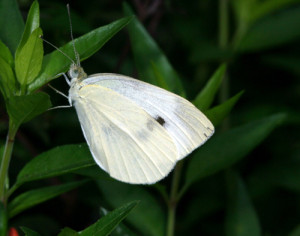It’s officially spring, and for most of us in Texas the average frost free date is now passed. This means that new vegetable gardens are appearing in backyards; and nurseries are selling tomato and pepper plants as fast as they can restock their shelves.

Not all butterflies are welcome in the vegetable garden. The cabbage white, or imported cabbageworm, butterfly attacks cabbage and other cruciferous crops.
I planted my modest vegetable and herb garden this weekend and literally before I could get my bok-choy and spinach in the ground, the pests were all over. While my Chinese cabbage was sitting in its small pot waiting to be planted, I watched a pesky cabbage white butterfly casually flutter by, and when it thought I wasn’t looking, zip down and lay its eggs on my new plants. When I turned over the leaves, sure enough, there were dozens of tiny butterfly eggs along with some healthy starter colonies of aphids.
So when lining up all you need for this year’s garden, don’t forget pest control. It’s not enough to add compost to your raised beds, purchase your plants, seed and fertilizer, and lay out the drip irrigation. It’s also important to assemble your arsenal of pest control tools.
This doesn’t necessarily mean succumbing to the need for ecologically disruptive conventional pesticides. There are several good, low impact options for aphids and caterpillars and other pests that should meet most gardener’s standards. Here are a few suggestions:
- Check all plants you buy from the nursery to make sure they’re pest free. Healthy plants should be free of sticky residue, free of holes in leaves, and free of insects (look under the leaves and along the stems, especially). This won’t ensure a pest-free garden, but it’s a good start.
- Consider using reflective mulch under your new transplants. Research shows that reflective mulch repels many insects including aphids and whiteflies. According to the University of California, both aphids and whiteflies are repelled by ultraviolet light from finding vegetables. Such mulches are being used in high value agricultural crops to reduce insect transmitted diseases, and are available online by searching for the terms “silver reflective mulch”.
- High pressure water wands can suppress early populations of aphids and mites on sturdier vegetable plants. By physically blasting pests off of plants with water, you delay the need to apply pesticides.
- Use horticultural oil on small, soft-bodied pests like mites and aphids and whiteflies. For most gardeners, this may be the harshest insecticide you will ever need to use. The secret to success, however, is getting the insecticide on the pests themselves. Oils and soaps leave no killing residue, so you only get what you hit.
- For caterpillars, the microbial insecticides Bacillus thuringiensis or spinosad are excellent, low impact pesticides that fit well with an organic gardening program. Both of these insecticides come from natural sources and both are soft on beneficial insects.
Whatever you do, start checking your plants early and control pests before they get you discouraged. Most pesticides, including the oils and microbial products listed here, do best when applied to the smallest life stages of pests. So don’t delay. Start your garden and your pest control today!